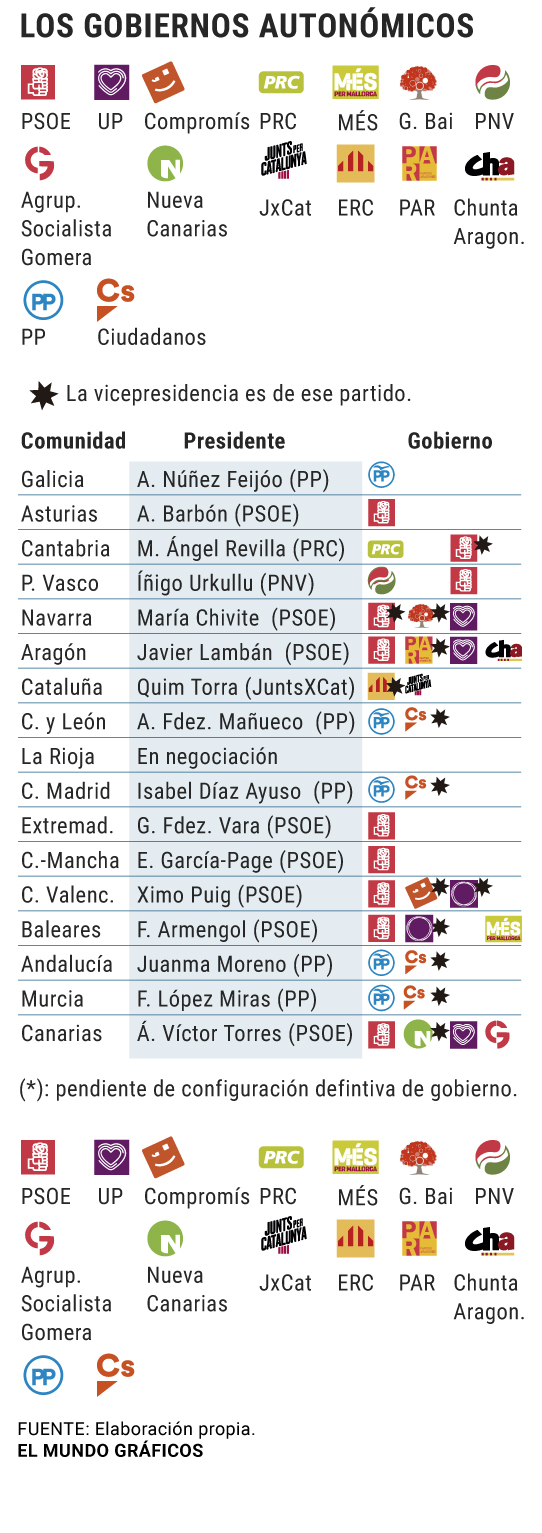- Aragón.Lambán claims the figure of Rubalcaba and return to the PSOE of the "centrality
- Politics: The King pressures the parties: "It is best to find a solution and not go to elections"
Neither Pedro Sánchez now nor Mariano Rajoy before, after the end of bipartisanship, were able to make normal in the Government of Spain what is absolutely common in almost all of Europe : coalition governments. Of course, the PSOE and the PP almost no longer govern otherwise in autonomous communities and municipalities, in which the exception is the executives alone. Only four communities of 17 have an executive with only one party. Or what is the same, 39,430,000 Spaniards live in a community that has a coalition government. In three the PSOE or the PP have an absolute majority: Castilla-La Mancha and Extremadura for the socialists and Galicia for the popular . In Asturias , Adrián Barbón has put into practice the model that Pedro Sánchez ambitions for the country: a solo executive with parliamentary support from the United Left and from Podemos.
The popular ones by the center and the right and the socialists by their left or by means of alliances with nationalist parties govern in coalition 12 communities (in Catalonia , the coalition is independentista, of JxCat with ERC).
PSOE: nine presidents
The Socialists have consolidated and gained territorial power after the May 26 elections, although they have not achieved the crown jewel, Madrid , where they won the elections. The PSOE has eight presidents and aspires to get the ninth in La Rioja , where the agreement with Podemos has not yet been possible.
The PSOE governs with an absolute majority Extremadura, with Guillermo Fernández Vara, and Castilla-La Mancha, with Emiliano García-Page, who obtained 38.08% and 32.37% respectively. In addition, Barbón has been president with the favorable vote of IU in the General Meeting of the Principality of Asturias .
In addition, the Socialists preside over five more regional governments with Podemos and with regionalist or nationalist forces. This is the case in Navarra , where María Chivite will have advisers from Geroa Bai and Podemos; Aragón, where Javier Lambán presides over a Government of four with the Aragonese Party , Podemos and La Chunta ; the Valencian Community, where Ximo Puig repeats coalition with Compromís incorporating Podemos; Baleares , which has a socialist president, Francina Armengol , with advisors from Podemos and Més , and Canarias , where the socialist Ángel Víctor Torres opens, which ends decades of hegemony of the Canary Coalition and governs with Nueva Canarias , Podemos and the Socialist Association from La Gomera . The Socialists also govern in coalition, without having the Presidency, the Basque Country with the PNV and Cantabria with the Regionalist Party of Miguel Ángel Revilla.
In addition, they aspire to reach an agreement with Podemos before new elections are called in La Rioja. In Logroño , those of Pablo Iglesias laid down the candidacy of the socialist, Concha Andreu , who intends to end 24 years in a row by PP governments.
PP: five governments
The PP has saved, by agreeing with Citizens and Vox, the autonomous governments that it already had despite having lost the elections, in addition to having joined in December the Junta de Andalucía, the most populated region in Spain. Alberto Núñez Feijóo is the only popular president with an absolute majority. Juan Manuel Moreno (Andalucía), Alfonso Fernández Mañueco ( Castilla y León ), Fernando López Miras ( Murcia ) and, soon, Isabel Díaz Ayuso (Madrid) preside over their communities with coalition governments with Citizens and Vox support. The coalitions that PP and Citizens have closed have always reserved the Presidency to the popular . But they have formed almost equal governments between both parties: six councilors for the PP and four for Cs in Castilla y León or Murcia or seven and six in Madrid.
Citizens: secondary actor
Citizens govern for the first time four communities: Andalusia since January, Castilla y León, the Region of Murcia and Madrid. But in all as a secondary partner of the PP, which presides and has kept the main councils. The oranges have refused to negotiate with the PSOE, although that way they could have chosen a presidency. The socialists of Castilla y León put it on the table to prevent the region from being in the hands of the PP 36 years in a row, but Citizens preferred to have a vice president under the command of the PP, the critic Francisco Igea , rather than a president agreeing with The PSOE
We can: two vice presidents
The purple ones have two vice-presidents -in the Valencian Community and the Balearic Islands-, in addition to a counselor in Aragon, Navarra and the Canary Islands. In addition, it is still pending entry into the Government of La Rioja, where they demanded three departments, although they only got one deputy.
According to the criteria of The Trust Project
Know more- We can
- PP
- Citizens
- PSOE
- IU
- Pedro Sanchez
- Vox
- Alberto Nunez Feijoo
- PNV
- Pablo Iglesias
- Maria Chivite
- Ximo Puig
- Isabel Díaz Ayuso
- Emiliano García-Page
- ERC
- Fernando López Miras
- Guillermo Fernández Vara
- Commitment
- Javier Lambán
- Canary Coalition
- Mariano Rajoy
- Michelangelo Revilla
- Politics
Politics Investiture debate: Pedro Sánchez launches a social discourse that can be assumed by Podemos and without a single mention to Catalonia
CataluñaArtur Mas proposes negotiating with PSOE and Podemos to avoid a government of the right
Politics Investiture session: Congress tombs the election of Pedro Sánchez as President of the Government with 155 votes against and 67 abstentions

